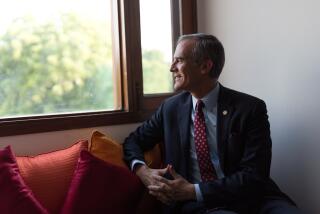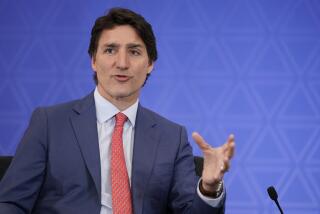Warming of India, Pakistan Relations Buoys Diplomat
ISLAMABAD, Pakistan — Deputy U.S. Secretary of State Richard L. Armitage said he was cautiously optimistic about the resumption of relations between Pakistan and India and that Pakistan’s leaders had assured him terrorists were not crossing into the Indian-controlled part of Kashmir.
Armitage stopped here in a move to encourage better relations between the two nuclear powers, embroiled in a 56-year dispute over Kashmir. Hopes for improvement have risen since last weekend’s announcement that the neighbors were resuming diplomatic relations after a two-year break.
In his talks with President Pervez Musharraf and Prime Minister Mir Zafarullah Khan Jamali on Thursday, Armitage sought assurances that Pakistan was not promoting terrorism by allowing militants to move from the areas it controls into India’s part of Kashmir. India contends Pakistan has allowed the traffic.
“President Musharraf gave absolute assurance that there was nothing happening across the line of control. There were no camps in Azad [Pakistani] Kashmir and if there were camps, they’d be gone tomorrow,” Armitage told reporters.
Pakistan has argued for more than half a century that the people of Kashmir, which has a Muslim majority, should be allowed to vote on their future. More than 63,000 people have been killed in separatist violence.
Peace overtures last month by Indian Prime Minister Atal Bihari Vajpayee led to the thaw in relations between the two countries, which have fought three wars since independence from British rule in 1947. Rail, air and highway links are also to be opened, to be followed most likely by renewed sporting and cultural ties.
Only last year, fears of a possible nuclear confrontation were running high after a December 2001 terrorist attack on the Indian parliament, which India blamed on Pakistan.
Small signs of a thaw were evident Thursday, when a delegation of 13 Pakistani legislators started a goodwill visit to India, crossing over at the border checkpoint of Wagah in India’s Punjab state. They received a warm welcome from officials.
Also Thursday, Vajpayee rejected Pakistan’s call that both countries scrap their nuclear weapons programs. Vajpayee repeated India’s position that its nuclear arsenal is for protection from surrounding countries, including China.
Indian officials also called on Musharraf to arrest those on a list of 20 alleged terrorists believed to be hiding in Pakistan.
For his part, Pakistani Foreign Minister Khurshid Kasuri warned that any discussion that “ignores the wishes of the Kashmiri people would not last long.”
Both parties have been urged to leave the Kashmir issue to the end of their talks and work instead on such outstanding problems as water rights, trade and the possible construction of a gas pipeline, running from Turkmenistan, through Afghanistan and Pakistan, to India.
“If there is success in other areas of dispute, both countries may compromise on Kashmir,” said Indian political expert Bharat Karnad of New Delhi’s Center for Policy Research. The countries’ leaders are expected to hold a summit, but not until other officials prepare the groundwork.
The last India-Pakistan summit involved Musharraf and Vajpayee and was held in Agra, India in 2001. It ended in a fiasco partly because too little groundwork had been laid and because the meetings were unstructured, observers say.
Armitage stressed he was not pressuring Pakistan or India to start a dialogue, only facilitating the peace process. During his last visit a year ago, Armitage played a key role in defusing tensions that had been festering after the attack on India’s parliament.
Armitage will make a brief stop in Afghanistan today to present a $100,000 donation to a Kabul art museum left in ruins by decades of war. He will then travel to India for talks with Indian leaders.
*
Times staff writer Kraul reported from Kabul and special correspondent Zaidi from Islamabad. Shankhadeep Choudhury in The Times’ New Delhi Bureau contributed to this report.
More to Read
Sign up for Essential California
The most important California stories and recommendations in your inbox every morning.
You may occasionally receive promotional content from the Los Angeles Times.










